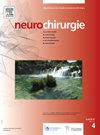Management of vestibular schwannoma during pregnancy: A systematic review
IF 1.4
4区 医学
Q4 CLINICAL NEUROLOGY
引用次数: 0
Abstract
Objective
This systematic review evaluates the management strategies for vestibular schwannoma (acoustic neuroma) during pregnancy, a rare but significant clinical condition, by synthesizing findings from case reports.
Methods
A comprehensive literature search was conducted across PubMed, Embase, Cochrane Library, Scopus, and Web of Science databases. Relevant case reports were included based on predefined inclusion and exclusion criteria. Data were extracted on patient demographics, tumor characteristics, clinical symptoms, management strategies, and outcomes.
Results
Thirty-seven cases were included, with a mean patient age of 28.72 years and a mean gestational age at diagnosis of 26.63 weeks. Hearing loss was the most common symptom (92.3%), followed by facial numbness (53.8%) and headache (41%). Tumor sizes ranged from 2.0 to 6.5 cm, with larger tumors associated with increased neurological symptoms. Surgical intervention was performed post-delivery in 78.9% of cases, while 21.1% underwent surgery during pregnancy. Seizures showed a statistically significant difference with the timing of surgery, with one case occurring during pregnancy and none post-delivery (p = 0.05). Most cases were managed conservatively, with surgery deferred until postpartum unless neurological decline or tumor growth warranted earlier intervention.
Conclusions
The management of vestibular schwannoma during pregnancy requires a multidisciplinary approach, balancing maternal and fetal health. Conservative management is generally preferred, with surgical intervention reserved for cases with significant symptoms. Hormonal changes during pregnancy may exacerbate tumor growth, underscoring the need for early diagnosis and careful monitoring. Further research is needed to optimize management guidelines and improve outcomes.
妊娠期间前庭神经鞘瘤的治疗:一项系统综述。
目的:本系统综述通过综合病例报告的结果,评估妊娠期间前庭神经鞘瘤(听神经瘤)的治疗策略,这是一种罕见但重要的临床疾病。方法:在PubMed、Embase、Cochrane Library、Scopus和Web of Science数据库中进行全面的文献检索。根据预定义的纳入和排除标准纳入相关病例报告。提取患者人口统计学、肿瘤特征、临床症状、管理策略和结果的数据。结果:纳入37例,平均年龄28.72岁,诊断时平均胎龄26.63周。听力损失是最常见的症状(92.3%),其次是面部麻木(53.8%)和头痛(41%)。肿瘤大小从2.0到6.5 cm不等,较大的肿瘤与神经系统症状增加有关。78.9%的患者在分娩后接受手术干预,21.1%的患者在怀孕期间接受手术干预。癫痫发作与手术时间的差异有统计学意义,1例发生在妊娠期间,无一例发生在分娩后(p = 0.05)。大多数病例采用保守治疗,除非神经功能下降或肿瘤生长需要早期干预,否则手术将推迟到产后。结论:妊娠期前庭神经鞘瘤的治疗需要多学科联合治疗,平衡母婴健康。通常首选保守治疗,对于有明显症状的病例保留手术干预。怀孕期间激素的变化可能会加剧肿瘤的生长,强调早期诊断和仔细监测的必要性。需要进一步的研究来优化管理指南和改善结果。
本文章由计算机程序翻译,如有差异,请以英文原文为准。
求助全文
约1分钟内获得全文
求助全文
来源期刊

Neurochirurgie
医学-临床神经学
CiteScore
2.70
自引率
6.20%
发文量
100
审稿时长
29 days
期刊介绍:
Neurochirurgie publishes articles on treatment, teaching and research, neurosurgery training and the professional aspects of our discipline, and also the history and progress of neurosurgery. It focuses on pathologies of the head, spine and central and peripheral nervous systems and their vascularization. All aspects of the specialty are dealt with: trauma, tumor, degenerative disease, infection, vascular pathology, and radiosurgery, and pediatrics. Transversal studies are also welcome: neuroanatomy, neurophysiology, neurology, neuropediatrics, psychiatry, neuropsychology, physical medicine and neurologic rehabilitation, neuro-anesthesia, neurologic intensive care, neuroradiology, functional exploration, neuropathology, neuro-ophthalmology, otoneurology, maxillofacial surgery, neuro-endocrinology and spine surgery. Technical and methodological aspects are also taken onboard: diagnostic and therapeutic techniques, methods for assessing results, epidemiology, surgical, interventional and radiological techniques, simulations and pathophysiological hypotheses, and educational tools. The editorial board may refuse submissions that fail to meet the journal''s aims and scope; such studies will not be peer-reviewed, and the editor in chief will promptly inform the corresponding author, so as not to delay submission to a more suitable journal.
With a view to attracting an international audience of both readers and writers, Neurochirurgie especially welcomes articles in English, and gives priority to original studies. Other kinds of article - reviews, case reports, technical notes and meta-analyses - are equally published.
Every year, a special edition is dedicated to the topic selected by the French Society of Neurosurgery for its annual report.
 求助内容:
求助内容: 应助结果提醒方式:
应助结果提醒方式:


